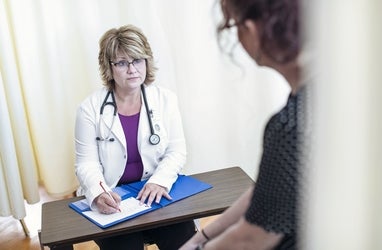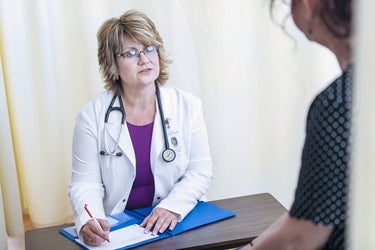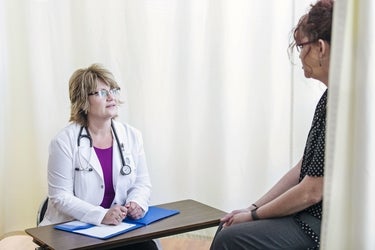Current MSN-FNP Student
Tell us your name and your expected graduation date.
My name is Rhonda McAnally and my expected graduation date is Spring of 2021.
What's your favorite part about being a nurse?
My favorite part of being a nurse is the patient interaction and also the variety of the types of patients that you see every day. Every day is a new challenge, every day is a new expectation and also a new potential diagnosis or something to learn. Being a nurse is just continually learning and trying to improve your skill set and then also improve your knowledge.
When did you decide you wanted to be a nurse practitioner?
I had been away from bedside nursing for about 10 years in more of an education and administrator role at my hospital where I currently work.

The reason I wanted to become a nurse practitioner is I really miss the patient interaction, and also I have been looking for a very flexible program to where I could fulfill my lifelong dream of becoming a nurse practitioner.
Tell us about your educational background.
My educational background started in 1988. After graduating high school, I started an Associate's degree program, registered nurse. I became a registered nurse in 1991, waited some years, got involved in Medical Center and hospital, worked emergency and trauma and decided I needed to further my education, so I started back to school in 2003, graduated in 2007 with my Bachelor's of nursing and took an administrative role at the medical center. So now I'm currently pursuing the nurse practitioner, and I started back in the fall of 2018 to fulfill my lifelong dream.
What are your future plans and how do you plan to achieve them?
Future plans are to become a nurse practitioner and probably re-invest myself back in emergency and urgent care nursing.
That's where my passion is, that's where I feel like that I belong because my total career has been involved with taking care of those critically ill or injured.
What impact do you want to have on the nurse practitioner profession?
An impact that I want to make on the nurse practitioner program is to show that individuals can get exceptional care and holistic care. I also [want to] be an adjunct to the physicians, or surgeons, in providing what I'm trying to say more of a holistic approach to the nursing and caring and compassion side. Also mentoring other nurses to fulfill their dreams, and it's never too late to learn something new and also acquire knowledge to help another individual. I believe that some of that is missing with the health care profession today.
People do not need to be treated like a number. They need to be treated with compassion, they need to be treated with respect.
And I feel like the nurse practitioner role can be expanded to where you're spending more time with your patients and truly educating them about their conditions and also being a adjunct to the physician and their practice.

Tell us what attracted you to the program at Carson-Newman and how did you know it was a right fit for you?
I relied a lot too on my faith. And when I saw that this program had become available, I had already investigated other programs in the area that offered a MSN FP option. I believe this option was right for me because it really catered to working adults, and also working nurses, and it's been very flexible with my Monday through Friday 10-hour day schedule, being an administrator role in the hospital, and also being able to access my studies on my time with some time-frames of deadlines that you have to meet. But I have found that the instructors have been incredibly flexible with work schedules, and been very understanding. So one thing that appealed to me was the faith-based and the Christian-based option, and also the flexibility of the program.
What are your expectations from your Carson-Newman educational experience?
My expectations: I become a great and exceptional nurse practitioner, to be able to provide that holistic care to individuals who are in need and to really just fulfill a lifelong dream of mine, to be able to be a provider and be able to spend the type of time I want to spend with patients.
How do you balance work life with your online courses and your personal obligations?
Very carefully. I have to plan. I have to plan when I'm gonna study, and then I also have to balance that time and spend time with my husband and children and usually I try to set aside Sundays after church to do that, either spend some quality time with my family because we all have busy and hectic lives and then also de-plug from each situation that I'm in. So I try not to let work bleed into family time or school into family time, but also know that I have to have a certain amount of time set aside to complete my homework, and studies as well, so that's how I've tried to balance it myself personally.
What advice do you have for potential students considering enrolling in the program?
Talk to the student advisors, see if you can access the faculty. Most everyone before I enrolled if I had questions, I felt like they were answered and they were very prompt in their responses back to me. I'd also talked to individuals who had been on campus and participated on the on-campus program, and found that this was the absolutely right fit for me, and I prayed a lot about it as well.
Have you been able to integrate what you've learned in the program so far, in your current job and if so, can you give me an example?
In my current role, one thing that I'm responsible for in my professional job now is I have to do research in community health needs assessments, so learning about the theoretical framework last semester, and the nursing theories as a basis to provide holistic care to individuals I felt was very, very eye-opening. The pathology, the physiology kind of comes - and then tying everything together in the physical assessments. But to me that's one thing that's really stood out so far in this program for me, and been very eye-opening: knowing the basis of those theories and applying [them] to how I approach doing a community health needs assessment or looking at targeted needs in the community.

How did working with a dedicated student support advisor impact your educational experience?
It has made all the difference in the world.
Any question that I had about the program or any issues that I thought that I was having, whether it was connectivity with internet or connectivity with my instructors, I felt my student advisor was key in making it all work, and there hasn't been a question that I have had that has not been promptly answered. And you just don't find that with other programs, especially online programs, that accessibility.
Tell us about your experience with the faculty of the program, is there one thing that stands out most to you about it or about them?
I would have to say yes, actually, the faculty member this semester who I've been assigned to with my video assessments has been so responsive, so good with feedback and letting me know about my approach, and what I've been doing with my assessment skills and how to do it correctly but in a kind and gentle way, and very encouraging, you know - don't give up, it takes practice, it takes you doing this every day, to really get and master the concept. So to me that really stood out. And then also the Skpye sessions with any of our instructors and the interaction. Dr. Casanova, Dr. Bolton, those have been incredibly helpful throughout the semester.
Do you find having small class sizes makes you feel like you're receiving more individual attention from the faculty?
I would have to say yes. And it's also a good opportunity to come together with your colleagues and classmates. You all are continuing a journey together, and that journey consists of support and drawing on each other strengths and also weaknesses to where you can help your fellow colleagues 'cause we're all on this journey together, we all have a goal to become a nurse practitioner. So I feel like the smaller class sizes are very instrumental in providing not only collegiate support but also a learning environment conducive of respect and just getting to know one another, knowing that you're not alone 'cause most of us who are in this room have families. We also have job responsibilities, we're all RNs. Some of us have a similar background, some do not, so we're drawing off each other's knowledge base, and then also support, to get through the program.
Did you find the faculty to be accessible, responsive, supportive, and professional?
I would have to say yes. The faculty that I've been involved with have been very supportive and accessible, either through email or even so far as going to give us their personal cell phone numbers to access them at any time.